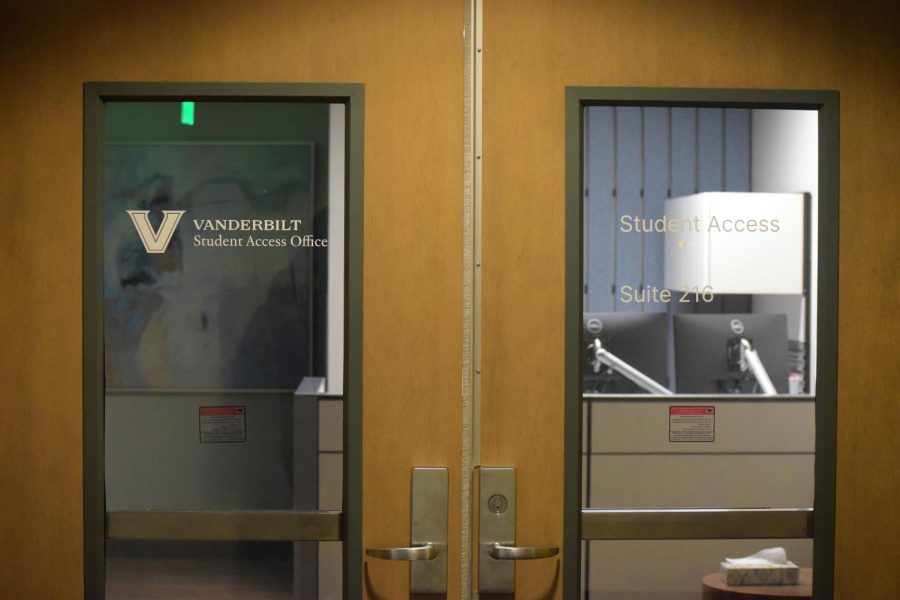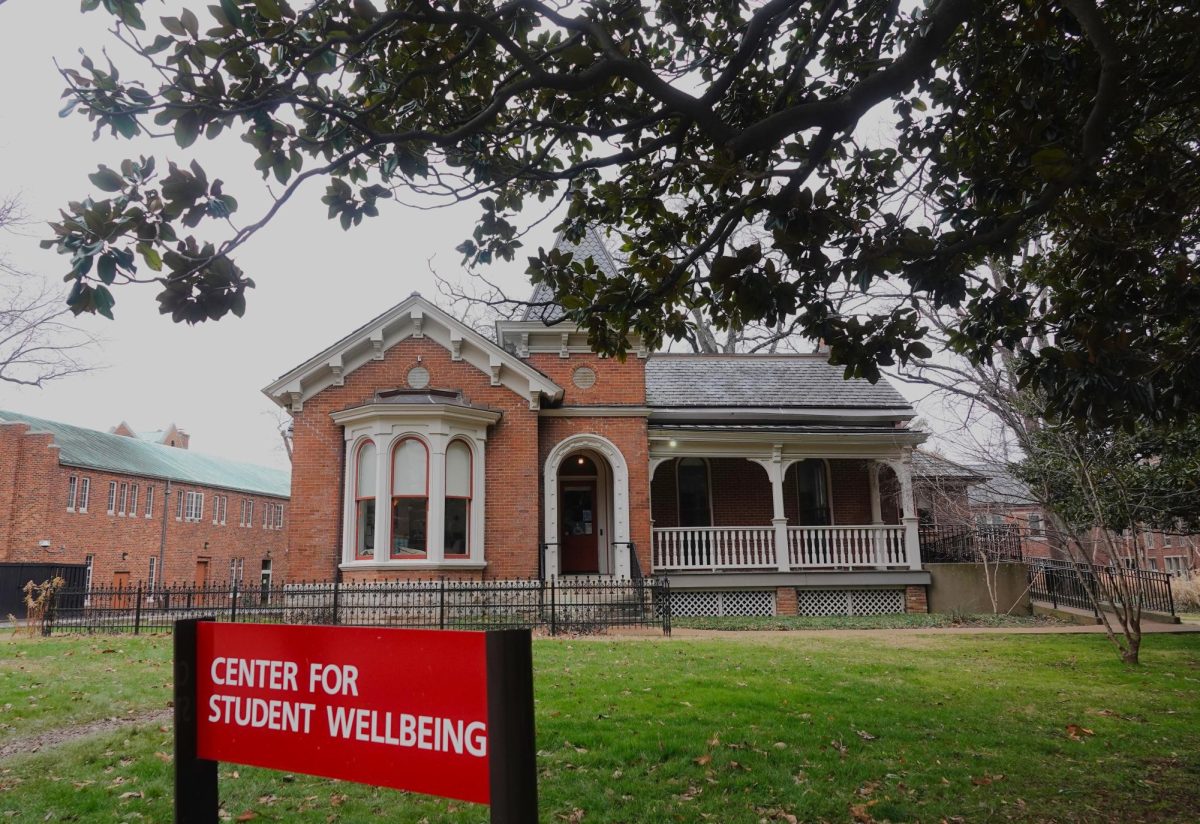The Student Access Office announced on Sept. 26 that it moved to room 216 in Sarratt Center from the Baker Building. Amid these changes aimed to improve accessibility, injured students allege challenges with long wait periods and a lack of support outside business hours.
The Student Access Office falls under the Equal Access Office in the Division of Administration and provides accommodations for students for a variety of circumstances, including temporary mobility accommodations for injured students. Director of the Student Access Office Jamie Bojarski said the new space was requested by students and faculty members.
“One of the most common mobility accommodations students request is a mobility ride,” Bojarski said. “Depending upon the individual, injury and situation, other accommodations may include a sit/stand desk for testing, breaks as needed, residence or classroom location change and priority registration to allow the student sufficient time to get between classes.”
Mobility rides are provided in partnership with the Equal Opportunity and Access, Public Safety and Transportation and Mobility offices. According to Bojarski, students can apply for a mobility ride via the Commodore Access Portal, and applications are reviewed by an Access Specialist. If the student qualifies for a mobility ride, they are notified along with Vanderbilt University Parking Services, which is responsible for implementing the mobility ride.
Junior Roni Wrobleski was diagnosed on Aug. 25 with tendinitis and tenosynovitis in both of her feet, which she said caused extreme pain when any pressure was put on her feet, especially when walking.
Wrobleski said that she immediately called the Student Access Office after her diagnosis to request a mobillity ride, but no one picked up the phone even though the office was open. She left a voicemail with her concerns and contact information and then emailed the office. Wrobleski said Student Access emailed her a link to their application, which she submitted. Upon submitting, Wrobleski stated that the application may take 7-10 days to process.
“This was something that I should have gotten on the day of,” Wrobleski said. “Seven to 10 business days was going to make the difference between being healthy and not being healthy.”
According to Bojarski, Student Access tries to process all temporary requests within 24 business hours, and that VUPS can usually accommodate ride requests while students wait for Student Access approval. After over a week passed, Wrobleski said that her medical situation got worse.
“This campus is not made to be accessible to someone with crutches. I had a boot, a brace and crutches, and I was trying to get around this school with hills, uneven pathways, lots of stairs and narrow sidewalks,” Wrobleski said. “My doctor said that I had to get off my feet immediately and that she would give me a pass if I wanted to miss classes because I should not be walking. I didn’t want to have to choose between going to class and being healthy.”
Wrobleski reached out to Vanderbilt Student Government, which helped her set up a meeting with Student Access the following week.
“I talked to [junior and VSG diversity and inclusion chair Shreya Gupta] after the meeting, and she told me that [Bojarksi and Tiffany Culver] were cold about [the situation] and were not treating me like a person,” Wrobleski said.
After the meeting with VSG, Student Access reached out to Wrobleski and requested that she submit documentation which Wrobleski said she had already submitted in the original application.
“With that, I broke down. It was so dehumanizing to have struggled with this for a long time when it had a physical and mental toll. I was upset that I had tried so hard and had done everything that I could to get the things that I needed for them not to even acknowledge that they failed,” Wrobleski said.
Only after Wrobleski’s mother reached out to Student Access did the office set up a meeting with Wrobleski to discuss her concerns. Student Access told her that they changed parts of their process to make things better. Once she started using the mobility ride, Wrobleski said that her condition improved.
“I felt like I hadn’t been treated like a human, and [Student Access] didn’t acknowledge the impact they had on me and my health,” Wrobleski said. “I hope they make further improvements.”
Junior Bea Grant shared a similar story of struggling to get around campus with an injury during the first few months of the Fall 2022 semester. Grant fractured her ankle in three places and tore the surrounding ligaments.
“There are so many stairs, and sometimes even when there are ramps, there are no buttons to open the doors,” Grant said. “The golf carts that drop me off sometimes don’t get very close, so I still have to walk far.”
Grant said that the process of getting approved for a mobility ride was long and challenging, echoing Wrobleski’s concerns. She said that it took several weeks for Student Access to get back to her after she submitted the application. Before she was approved for a mobility ride, Grant had to call a Community Service Officer via the VUPD non-emergency line every time she needed to go somewhere. These rides can’t be scheduled in advance, and Grant said that it typically took 10-20 minutes for the CSO to arrive. Grant added that the limited availability of mobility rides is one of the biggest problems with the current system.
“The golf cart mobility rides actually don’t take you to doctor’s appointments. You either have to get a CSO to take you or fill out a waiver for a reimbursement, but you can’t pre-schedule rides with the provided mobility rides,” Grant said. “[Mobility rides] are not available on weekends, and they’re not available after 8 p.m., which means that people would have to bring me things for dinner. Even with the new reusable containers, people couldn’t bring me food because you only get one [container].”
In a message to The Hustler, Bojarski said that mobility rides are only meant to take students from their on-campus residence to class and from class to class, which leads to most mobility rides happening between Monday and Friday from 8:00 a.m. to 5:00 p.m. If students need rides outside of those times and places, she said they can contact MoveVU. Students in need of rides to medical appointments can contact the Student Care Coordination office to set up a Lyft ride. Bojarski cited campus-wide accessibility as of the utmost importance to Student Access moving forward.
“Accessibility is a key consideration as the university continuously updates buildings and builds new residential colleges and academic buildings,” Bojarski said. “A few examples are the new West End neighborhood that is fully accessible via wheels and the new [6 Magnolia Circle] and Mayborn renovation. If a student needs specific access points, they can contact our office for assistance.”








